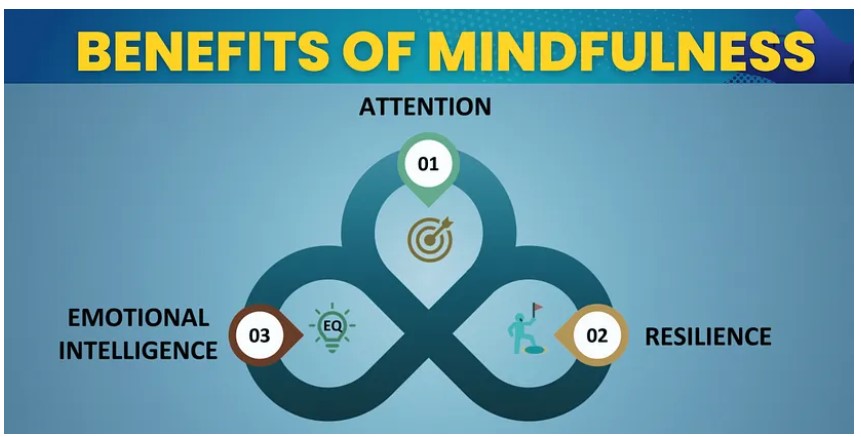In our fast-paced and interconnected world, Mindfulness and Emotional Intelligence have emerged as crucial skills for effective interpersonal communication and personal well-being. These abilities play a crucial role in our personal and professional relationships, affecting our productivity, satisfaction, and overall quality of life. This post will explore the intertwining relationship between mindfulness and emotional intelligence, highlighting the importance of developing both for a balanced life.
What is Mindfulness?
Mindfulness is a practice and state of mind characterized by intentionally bringing one’s attention to the present moment with openness, curiosity, and non-judgment. It involves paying attention to one’s thoughts, feelings, bodily sensations, and the surrounding environment without getting caught up in them or reacting impulsively. Mindfulness is rooted in ancient contemplative traditions, particularly in Buddhist philosophy, but has gained popularity and recognition in modern contexts, including psychology and education.
At its core, mindfulness involves cultivating awareness and acceptance of the present moment, including both internal experiences (such as thoughts and emotions) and external sensations. It encourages individuals to observe their experiences without judgment or attachment, allowing them to develop a greater sense of clarity, self-awareness, and emotional regulation.
Mindfulness can be practiced through various techniques, such as focused breathing, body scans, meditation, or engaging in everyday activities with full attention. By practicing mindfulness regularly, individuals can develop a greater ability to stay present, reduce stress, improve concentration, enhance emotional well-being, and cultivate a more compassionate and non-reactive mindset.
In educational settings, mindfulness is increasingly recognized for its potential to support student well-being, promote emotional resilience, enhance focus and attention, improve academic performance, and foster positive relationships. It is often integrated into curricula and classroom practices as a tool for self-care, stress reduction, and promoting a positive learning environment.

What is Emotional Intelligence?
Emotional intelligence refers to the ability to recognize, understand, manage, and use emotions effectively in ourselves and others. Emotional intelligence refers to the ability to recognize, understand, and manage one’s own emotions, as well as the emotions of others. It involves being aware of and effectively using emotional information to guide thinking, behavior, and decision-making. Emotional intelligence encompasses a set of skills and competencies that are crucial for navigating social interactions, building relationships, and achieving personal and professional success. There are four main components of emotional intelligence:
Self-awareness
This involves recognizing and understanding one’s own emotions, strengths, weaknesses, values, and goals. It involves being in tune with one’s own feelings, thoughts, and motivations.
Self-management
This refers to the ability to regulate and manage one’s own emotions, impulses, and behaviors. It involves being able to control emotional reactions, adapt to changing circumstances, and handle stress effectively.
Social awareness
This component involves perceiving and understanding the emotions and needs of others. It includes being attentive to social cues, empathizing with others, and demonstrating a genuine interest and concern for their well-being.
Relationship management
This refers to the ability to establish and maintain healthy and positive relationships with others. It involves effective communication, conflict resolution, collaboration, and leadership skills.
Emotional intelligence is not fixed and can be developed and improved through self-reflection, practice, and learning. It is considered a valuable skillset in various domains of life, including personal relationships, workplace environments, leadership positions, and educational settings. Individuals with high emotional intelligence are generally better equipped to handle stress, build positive relationships, make informed decisions, and navigate social situations with empathy and understanding.
The Intersection of Mindfulness and Emotional Intelligence
How do mindfulness and emotional intelligence connect? They are, in fact, intricately linked. Mindfulness can be seen as a pathway to enhancing emotional intelligence.
Enhancing Self-Awareness
The practice of mindfulness increases self-awareness. When we’re mindful, we pay attention to our thoughts and feelings without judgment. This heightened awareness of our own emotional state is a fundamental aspect of emotional intelligence.
Boosting Self-Management
Mindfulness supports self-management by teaching us to respond rather than react to situations. Instead of being carried away by emotions, mindfulness encourages us to pause, identify the emotion, and choose how to respond effectively.
Fostering Social Awareness
When we’re more aware of our own emotions, we’re better equipped to empathize with others’ emotions. Mindfulness fosters a sense of compassion and understanding, key components of social awareness.
Improving Relationship Management
As mindfulness enhances our self-awareness and empathy, our capacity to manage relationships also improves. We become more adept at understanding others’ perspectives, improving communication, resolving conflicts, and cooperating within a group.
Developing Mindfulness and Emotional Intelligence
The beautiful thing about both mindfulness and emotional intelligence is that they can be cultivated with practice. Here are a few strategies you can adopt:
- Daily Mindfulness Practice: Commit to a daily mindfulness practice. This can take the form of meditation, deep-breathing exercises, mindful eating, or simply taking a few moments each day to focus on the present moment.
- Emotional Regulation Exercises: Practice recognizing your emotions, labeling them, and deciding the best course of action. Emotional regulation exercises can support this process.
- Empathy Practice: Try to understand the emotions and perspectives of those around you. Active listening can be a helpful tool in this regard.
- Communication Skills: Work on your communication skills, focusing on clearly expressing your needs and understanding the needs of others.
In conclusion, mindfulness and emotional intelligence, though distinct concepts, are closely related. Cultivating mindfulness can foster emotional intelligence, enabling us to lead more balanced, fulfilling, and successful lives. So, take a moment to pause, breathe, and engage with your emotions. The benefits are boundless.
Further Reading on Motivation
- The Art of Effective Communication
- Time management and procrastination
- The Stephen King Life Story
- Life lessons from lion
- The Power of Belief